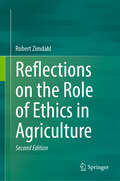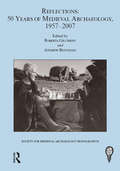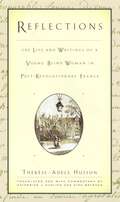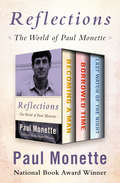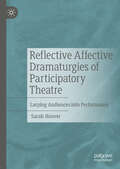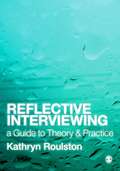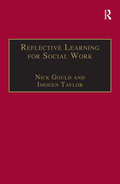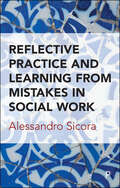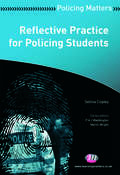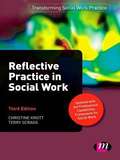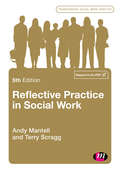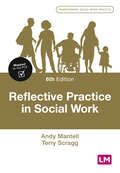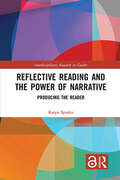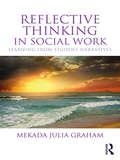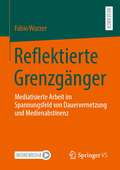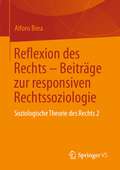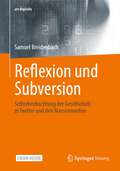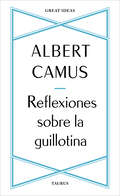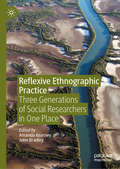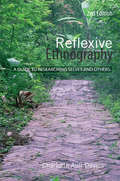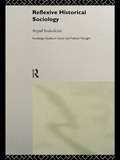- Table View
- List View
Reflections on the Role of Ethics in Agriculture
by Robert ZimdahlThis volume is an update to Weed Science- A Plea for Thought-Revisited published by Springer in 2012. More than a decade after the first edition, ethical discussion on the use of pesticides for weed management is largely absent. Startingly, weed science and agriculture have continued on the same path and are still dominated by capital chemical and energy intensive practices, including the paralysis of pesticides. This second edition expands upon the first, using recent data to confirm the dominance of herbicides. The revision includes chapters which emphasize the role of ethics in agriculture and the reasons it should, but has not yet become part of agricultural education. This includes suggestions on how education in agricultural ethics should be shifting and whose responsibility it is. The revised version also includes a discussion on the role of genetically modified crops and the consequences of using these crops-both positive and negative. Scientists have developed a wealth of knowledge they bring to the surface of their disciplinary silos. Yet there needs to be greater discussion on the necessity and risks of agricultural science and technology. This revised version provides a rigorous examination of weed science’s goals and ethics and challenges the way we manage weeds and agriculture.
Reflections: 50 Years of Medieval Archaeology, 1957-2007 (The Society for Medieval Archaeology Monographs)
by Roberta GilchristThis volume celebrates the 50th anniversary of the Society for Medieval Archaeology (established in 1957), presenting reflections on the history, development and future prospects of the discipline. The papers are drawn from a series of conferences and workshops that took place in 2007-08, in addition to a number of contributions that were commissioned especially for the volume. They range from personal commentaries on the history of the Society and the growth of the subject (see papers by David Wilson and Rosemary Cramp), to historiographical, regional and thematic overviews of major trends in the evolution and current practice of medieval archaeology. All the publications are fully refereed with the aim of publishing at the highest academic level reports on sites of national and international importance, and of encouraging the widest debate. The series’ objectives are to cover the broadest chronological and geographical range and to assemble a series of volumes which reflect the changing intellectual and technical scope of the discipline.
Reflections: The Life and Writings of a Young Blind Woman in Post-Revolutionary France (The History of Disability #5)
by Therese-Adèle HussonIn the 1820s, several years before Braille was invented, Therese-Adele Husson, a young blind woman from provincial France, wrote an audacious manifesto about her life, French society, and her hopes for the future. Through extensive research and scholarly detective work, authors Catherine Kudlick and Zina Weygand have rescued this intriguing woman and the remarkable story of her life and tragic death from obscurity, giving readers a rare look into a world recorded by an unlikely historical figure. Reflections is one of the earliest recorded manifestations of group solidarity among people with the same disability, advocating self-sufficiency and independence on the part of blind people, encouraging education for all blind children, and exploring gender roles for both men and women. Resolutely defying the sense of "otherness" which pervades discourse about the disabled, Husson instead convinces us that that blindness offers a fresh and important perspective on both history and ourselves.In rescuing this important historical account and recreating the life of an obscure but potent figure, Weygand and Kudlick have awakened a perspective that transcends time and which, ultimately, remaps our inherent ideas of physical sensibility.
Reflections: The World of Paul Monette
by Paul MonetteFrom an acclaimed memoirist and National Book Award winner: Three groundbreaking works of nonfiction put a human face on the AIDS epidemic. Paul Monette&’s searing memoirs of growing up, coming out, and losing his beloved partner to AIDS are now available in a single volume. Becoming a Man: This National Book Award–winning memoir follows Monette&’s childhood. Growing up all-American, Catholic, overachieving . . . and closeted, Monette wrestled with his sexuality for the first thirty years of his life, priding himself on his ability to &“pass&” for straight. This intimate portrait of a young man&’s struggle with his own desires and journey to adulthood and self-acceptance through grace and honesty is witty, humorous, and deeply felt. Borrowed Time: Chronicling Monette&’s relationship with Roger Horwitz, this tragic true story follows Horwitz&’s fight against and eventual death from AIDS. A &“tender and lyrical&” memoir (TheNew York Times Book Review), it remains one of the most raw and human tales of the AIDS era—a &“searing, shattering, ultimately hope-inspiring account of a great love story&” (San Francisco Examiner). The Last Watch of the Night: Compiling work from the last two years of his life, this collection of essays documents Monette&’s reflections as he slowly succumbed to AIDS. Ringing with humor, rage, and passion, his words provide a breathtaking view from inside the AIDS scourge. Brutal, funny, and startlingly honest, this comprehensive volume brings together some of the most important stories of the AIDS era.
Reflective Affective Dramaturgies of Participatory Theatre: Larping Audiences into Performance
by Sarah HooverAs the popularity and diversity of participatory theatre productions increase, scholarly and artistic attention toward the audience as agentive contributors and interpreters must keep pace. Simultaneously, the COVID-19 pandemic has added urgency to the collective artistic encounter and its value to individual and community health. This book proposes “reflective affective” dramaturgies of participatory theatre aimed toward incorporating participants’ reflections and affective responses as material in an emergent exploration of represented systems of power. The volume's interdisciplinary theoretical frameworks stem from performance studies discourses including feminist materialism, phenomenology and affect theory, bringing them together with larp scholarship on character/self performance, agency and emergence. Through its integration of the practical and theoretical, this work serves as an essential study for scholars, students and artists in theatre studies, performance studies, visual art studies, role-play studies, cultural studies, and philosophy.
Reflective Interviewing: A Guide to Theory and Practice
by Kathy RoulstonQualitative researchers have long made use of many different interview forms. Yet, for novice researchers, making the connections between "theory" and "method" is not always easy. This book provides a theoretically-informed guide for researchers learning how to interview in the social sciences. In order to undertake quality research using qualitative interviews, a researcher must be able to theorize the application of interviews to investigate research problems in social science research. As part of this process, researchers examine their subject positions in relation to participants, and examine their interview interactions systematically to inform research design. This book provides a practical approach to interviewing, helping researchers to learn about themselves as interviewers in ways that will inform the design, conduct, analysis and representation of interview data. The author takes the reader through the practicalities of designing and conducting an interview study, and relates various forms of interview to different underlying epistemological assumptions about how knowledge is produced. The book concludes with practical advice and perspectives from experienced researchers who use interviews as a method of data generation. This book is written for a multidisciplinary audience of students of qualitative research methods.
Reflective Learning for Social Work: Research, Theory and Practice
by Imogen Taylor Nick GouldSince the publication of Donald Schön's The Reflective Practitioner in 1983 there has been a dramatic growth of research and writing developing the concept of reflective learning. Surprisingly, there has been little application of concepts of reflective learning to social work education. This volume: ¢ makes accessible for the first time to a social work readership a book which focuses on reflective learning in social work ¢ brings together material on reflective learning from both academic and practice settings ¢ creates a seminal text for educators and trainers in universities and practice settings ¢ has relevance to an international readership, with contributions from the UK, USA, Canada and Australia.
Reflective Practice
by Alessandro SicoraWhat is a mistake in social work and how can we turn it into a positive learning experience? Simply going over the events of the day is often not enough and can become overwhelming. Learning from professional errors is, however, vital for successful reflective practice. This important book presents a theoretical framework that underpins this learning, along with a series of strategies for social workers to use either by themselves or as part of a group. These include creating questions and narratives to enhance learning, assertive techniques for receiving and offering criticism and organisational learning from mistakes. With plenty of practice examples and questions for reflection, this is essential reading for both social work students, and practitioners and managers at all stages of their career.
Reflective Practice for Policing Students (Policing Matters Series)
by Selina CopleyReflective practice is a key element of both police training and police practice in the 21st century. This text provides an essential guide to reflective practice for all those studying for degrees and foundation degrees in policing. Taking an accessible and practical approach, the book considers four broad areas. It looks at what reflective practice is, including practical models of reflection, and discusses why it is important. It examines reflective practice within the specific context of policing through a range of case studies and examples, and considers the vital role of reflective practice as part of continuing professional development.
Reflective Practice in Social Work
by Christine Knott Mr Terry ScraggReflective practice is a key element of learning and development on social work courses and it is an important aspect of social work practice. This accessible and introductory text explores a range of approaches to reflective practice that will help students become more confident in answering the question 'what is reflective practice?' There are sections on writing reflective journals, communicating well with service users and carers and reflective practice while on placements. Written in three parts, this essential guide starts with a broad exploration of reflection, drawing on key texts that have informed its development. It then moves on to real practice issues including the management of social work practice and interprofessional working. Finally, part three looks at maintaining reflective practice and how to use these skills during your time as a social worker. Fully updated with the Professional Capabilities Framework, this third edition is a must-have for all social work students at the beginning of their careers.
Reflective Practice in Social Work
by Christine Knott ScraggReflective practice is a key learning and development process on social work courses. This book looks at the concept of reflection and reflective social work practice from a more critical stance than previous texts and in accessible ways involving case material and practical tasks. Divided into two parts, the main section of the book will examine some of the more difficult and radical applications of the concept - for example emotionally intelligent workers, dangerousness, men in social work and inter-professional leadership. The final section will explore how a reflective approach to practice can be maintained and enhanced in the workplace.
Reflective Practice in Social Work (Transforming Social Work Practice Series)
by Andy Mantell Mr Terry ScraggReflective practice is at the heart of becoming a competent and confident social worker. It's both a key element of learning and development on social work courses and an important aspect of social work practice. This accessible and introductory text explores a range of approaches to reflective practice to help students become more confident in answering key questions, including 'what is reflective practice?', 'how do I develop as a reflective practitioner?' and 'how do I maintain reflective practice in key contexts?'. There are many useful resources such as Writing reflective journals, Communicating well with service users and carers and Reflective practice while on placements.
Reflective Practice in Social Work (Transforming Social Work Practice Series)
by Andy Mantell Mr Terry ScraggReflective practice is at the heart of becoming a competent and confident social worker. It's both a key element of learning and development on social work courses and an important aspect of social work practice. This accessible and introductory text explores a range of approaches to reflective practice to help students become more confident in answering key questions, including 'what is reflective practice?', 'how do I develop as a reflective practitioner?' and 'how do I maintain reflective practice in key contexts?'. There are many useful resources such as Writing reflective journals, Communicating well with service users and carers and Reflective practice while on placements.
Reflective Practice in Social Work (Transforming Social Work Practice Series)
by Andy Mantell Terry ScraggReflective practice is at the heart of becoming a competent and confident social worker. It’s both a key element of learning and development on social work courses and an important aspect of social work practice. This accessible and introductory text explores a range of approaches to reflective practice, its main aim being to help you as a student become more confident in answering key questions, including ′what is reflective practice?′, ‘how do I develop as a reflective practitioner?’, ‘how do I maintain reflective practice in key contexts?’. There are sections on writing reflective journals, communicating well with service users and carers and reflective practice while on placements.
Reflective Practice in Social Work (Transforming Social Work Practice Series)
by Andy Mantell Terry ScraggReflective practice is at the heart of becoming a competent and confident social worker. It’s both a key element of learning and development on social work courses and an important aspect of social work practice. This accessible and introductory text explores a range of approaches to reflective practice, its main aim being to help you as a student become more confident in answering key questions, including ′what is reflective practice?′, ‘how do I develop as a reflective practitioner?’, ‘how do I maintain reflective practice in key contexts?’. There are sections on writing reflective journals, communicating well with service users and carers and reflective practice while on placements.
Reflective Reading and the Power of Narrative: Producing the Reader (Interdisciplinary Research in Gender)
by Karyn SprolesReflective Reading and the Power of Narrative: Producing the Reader is an interdisciplinary exploration into the profound power of narratives to create—and recreate—how we imagine ourselves. It posits that the process of producing a text also produces the reader. Written from the perspective of a psychoanalytic feminist, Sproles considers a wide array of examples from literature, popular culture, and her own experiences to illustrate what she calls "reflective reading"—a metacognitive reading practice that recognizes the workings of the unconscious to push the reader toward a potentially transformational engagement with narrative. This may manifest as epiphany, recovery from loss or resolution of repressed trauma. Each chapter draws on examples of characters and authors who model a reflective reading process from Jane Austen and Virginia Woolf to Johnny Cash and Alison Bechdel. By reclaiming the role of the unconscious, Karyn Sproles reinvigorates the theoretical work begun by reader-response criticism and develops a deep understanding of identification and transference as an integral part of the reading process. For students and researchers of cultural studies, psychoanalysis, gender studies and feminist literature and theory, Reflective Reading and the Power of Narrative offers innovative and accessible ideas on the relationship between reader and text.
Reflective Thinking in Social Work: Learning from student narratives
by Mekada Julia GrahamIt is vital that social work students learn to integrate their personal and professional selves if they are to meet the challenges of social work in complex changing environments. This accessible text is designed to enable readers to explore and build on their existing skills and abilities, supporting them to become competent and self-aware reflective practitioners. Reflective Thinking in Social Work uses stories told by a range of social work students to model reflective practice learning. Discussing issues such as identity, motivation to enter the social work profession and lived experiences in the journey into social work, the book brings together stories of hardship, privilege, families, hopes, interests and community activism from many diverse ethnic backgrounds. Each narrative is introduced by the author and ends with a commentary drawing out the key themes and exploring how the reader can use the narrative to enhance their own understanding and critical thinking, and to engage in transformative practice. Framed by an in-depth discussion of available frameworks for reflective practice in different contexts and the importance of narratives in constructing identities, this is an invaluable text for social work students at both bachelor's and master's degree levels.
Reflektierte Grenzgänger: Mediatisierte Arbeit im Spannungsfeld von Dauervernetzung und Medienabstinenz
by Fabio WurzerWie gestaltet sich für Pfarrpriester unter dem Einfluss der Nutzung von Technologien zur digitalen Vernetzung die Wahrnehmung von und der Umgang mit Raum, Zeit und sozialen Beziehungen? Diese Frage versucht der Autor in dieser empirischen Arbeit zu beantworten, indem er das Zusammenspiel zwischen der Nutzung digitaler Medien und der Anwendung sozialer Praktiken im Pfarralltag untersucht. Auf Grundlage der Daten konnte für die gegenständliche Studie der Idealtypus des Reflektierten Grenzgängers entwickelt werden. Dieser Idealtypus beschreibt einen Menschen, der nach einer reflektierten Gestaltung seiner Lebensbereiche Arbeit und Freizeit strebt, um nicht wie der Idealtypus des Effizienten Menschen ein Maximum an Aufgaben, sondern die jeweiligen Aufgaben bestmöglich zu bewältigen. Eine effiziente Mediennutzung und das Grenzmanagement sind folglich nur die Voraussetzungen, um in einer von digitalen Medien durchsetzten Welt bestmögliche Arbeit leisten zu können.
Reflexion des Rechts – Beiträge zur responsiven Rechtssoziologie: Soziologische Theorie des Rechts 2
by Alfons BoraDieses Buch versammelt Überlegungen zur Rechtssoziologie und zur soziologischen Rechtstheorie. Einzelstudien auf verschiedenen rechtssoziologischen Forschungsgebieten verdeutlichen die Möglichkeiten einer responsiven soziologischen Theorie des Rechts. Diese greift rechtstheoretische Fragen auf und macht sie soziologisch relevant. Die soziologische Theorie des Rechts verkörpert so die interdisziplinäre Integration von Autonomie und Praxis.
Reflexion und Subversion: Selbstbeobachtung der Gesellschaft in Twitter und den Massenmedien (ars digitalis)
by Samuel BreidenbachDie ehemals den Massenmedien vorbehaltene Funktion, die Gesellschaft zu reflektieren und diese gesellschaftlichen Selbstbeschreibungen auch gesellschaftsweit bekannt zu machen, kann heute auch von Social-Media-Plattformen erfüllt werden, wenn die Nutzer*innen dort die Gesellschaft beschreiben und diese Beiträge massenhaft verbreitet werden. Gleichzeitig unterscheiden sich die in den Social Media verbreiteten Gesellschaftsbeschreibungen enorm von jenen herkömmlicher Massenmedien – nicht zuletzt aufgrund der technischen Infrastrukturen der Plattformen. Aus Perspektive der sozialen Systemtheorie werden am Beispiel von Twitter Gemeinsamkeiten und Differenzen zwischen diesen beiden Formen gesellschaftlicher Selbstreflexion herausgearbeitet. Vor allem aber soll die Analyse die grundsätzlich divergenten Wirkungen aufzeigen, welche die (Selbst-)Reflexion der Gesellschaft nach sich ziehen kann, wenn diese einerseits gesellschaftliche Komplexität als einheitliche Realität greifbar macht und damit der Selbstvergewisserung dient, andererseits genauso die Kritik und das Hinterfragen des Bestehenden erlaubt.
Reflexiones sobre la guillotina
by Albert CamusEl breve pero gran ensayo del Nobel de Literatura, Albert Camus, contra la pena de muerte en Francia: uno de los textos más poderosos y persuasivos jamás escrito contra este castigo. A lo largo de la historia, algunos libros han cambiado el mundo. Han transformado la manera en que nos vemos a nosotros mismos y a los demás. Han inspirado el debate, la discordia, la guerra y la revolución. Han iluminado, indignado, provocado y consolado. Han enriquecido vidas, y también las han destruido. Taurus publica las obras de los grandes pensadores, pioneros, radicales y visionarios cuyas ideas sacudieron la civilización y nos impulsaron a ser quienes somos. Este poderoso texto, uno de los más hermosos y persuasivos que escribió Albert Camus, sitúa el respeto a la vida humana por encima de la necesidad de cumplimiento de la ley. Sus argumentos contra la violencia de Estado y las penas ejemplares tienen plena vigencia hoy, y conforman una obra clave para entender el pensamiento ético del premio Nobel.
Reflexive Ethnographic Practice: Three Generations of Social Researchers in One Place
by John Bradley Amanda KearneyPutting the anthropological imagination under the spotlight, this book represents the experience of three generations of researchers, each of whom have long collaborated with the same Indigenous community over the course of their careers. In the context of a remote Indigenous Australian community in northern Australia, these researchers—anthropologists, an archeologist, a literary scholar, and an artist—encounter reflexivity and ethnographic practice through deeply personal and professionally revealing accounts of anthropological consciousness, relational encounters, and knowledge sharing. In six discrete chapters, the authors reveal the complexities that run through these relationships, considering how any one of us builds knowledge, shares knowledge, how we encounter different and new knowledge, and how well we are positioned to understand the lived experiences of others, whilst making ourselves fully available to personal change. At its core, this anthology is a meditation on learning and friendship across cultures.
Reflexive Ethnography: A Guide to Researching Selves and Others (The\asa Research Methods Ser.)
by Charlotte Aull DaviesReflexive Ethnography is a unique guide to ethnographic research for students of anthropology and related disciplines. It provides practical and comprehensive guidance to ethnographic research methods, but also encourages students to develop a critical understanding of the philosophical basis of ethnographic authority. Davies examines why reflexivity, at both personal and broader cultural levels, should be integrated into ethnographic research and discusses how this can be accomplished for a variety of research methods. This revised and updated second edition includes: a new chapter on internet-based research and ‘interethnography’ chapters on selection of topics and methods, data collection and analysis, and ethics and politics of research practical advice on writing up ethnographic study new and updated research examples. Postmodernist relativism can lead to an over-emphasis on reflexivity that denies the possibility of social research. Reflexive Ethnography utilises postmodernist insights – incorporation of different standpoints, exposure of the intellectual tyranny of meta-narratives – but proposes that reflexive ethnographic research be undertaken from a realist perspective. Reflexive Ethnography will help students to use and understand ethnographic research practices that fully incorporate reflexivity without abandoning claims to develop valid knowledge of social reality.
Reflexive Historical Sociology (Routledge Studies in Social and Political Thought #Vol. 22)
by Arpad SzakolczaiThis book reconstructs and brings together the work of a number of social and political theorists in order to gain new insight on the emergence and character of modern Western society. It examines the intersection point of social theory and historical sociology in a new theoretical approach called "reflexive historical sociology". There is analysis of the works of Max Weber, Michel Foucault, Norbert Elias, Eric Voegelin and a number of others. The book is divided into three parts. Part 1 examines the works of Eric Voegelin, Norbert Elias, Lewis Mumford and Franz Borkenau. Part 2 is concerned with the major conceptual tools such as experience, liminality, process, symbolisation, figuration, order, dramatisation and reflexivity, and themes such as the history of forms of thought, subjectivity, knowledge and closed space and regulated time. Finally, the book examines the most important insights of the thinkers discussed, concerning the historical processes that led to modernity.
Reflexive Methodology: New Vistas for Qualitative Research
by Mats Alvesson Kaj SkoldbergPraise for the Second Edition: "In opposition to most literature on how to conduct good social science research which is either empirically oriented or gives priority to theoretical and philosophical considerations, which tends to make empirical research look odd or irrelevant, this volume on ′Reflexive Methodology′ explicitly turns towards a consideration of the perceptual, cognitive, theoretical, linguistic, political and cultural circumstances as backdrop of data interpretation and research design. It showed up to be the most important and informative resource and a source of enlightenment to my lecture on methodology at our institute. I can highly recommend the volume to lecturers and students alike." Professor Sabine Troeger, Geography Institute - Library, University of Bonn Reflexivity is an essential part of the research process. Mats Alvesson and Kaj Sköldberg make explicit the links between techniques used in empirical research and different research traditions, giving a theoretically informed approach to qualitative research. The authors provide balanced reviews and critiques of the major schools of grounded theory, ethnography, hermeneutics, critical theory, postmodernism and poststructuralism, discourse analysis, genealogy and feminism. Useful reading for students and researchers across the social sciences. The first edition established itself as a ground-breaking success, providing researchers with an invaluable guide to a central problem in research methodology - namely, how to put field research and interpretations in perspective, paying attention to the interpretive, political and rhetorical nature of empirical research. The second edition introduced a new chapter on positivism, social constructionism and critical realism, and offered new conclusions on the applications of methodology. This third edition of Reflexive Methodology provides further updates on new research, including neorealism, and illustrations and applications of reflexive methodology in formulating research strategies, that build on the acclaimed and successful previous editions
